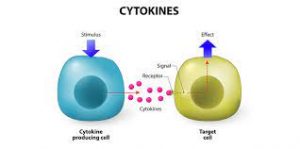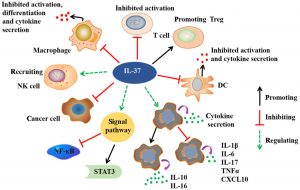Definition of cytokines
Cytokines are a large group of proteins, peptides, or glycoproteins that are secreted by specific cells of the immune system. Cytokines are a category of signalling molecules that mediate and regulate immunity, inflammation, and hematopoiesis. Cytokines are produced throughout the body by cells of diverse embryological origins. Cytokine is a general name; other names are defined based on their presumed function, cell of secretion or target of action.
For example, cytokines produced by lymphocytes may also be referred to as lymphokines. Many of the lymphokines are also known as interleukins (ILs), as they are not only secreted by leukocytes but can also affect the cellular responses of leukocytes. Cytokine Recombinants secreted by monocytes or macrophages are called monokines. And chemokines are cytokines with chemotactic activities. Cytokines and their receptors exhibit a very high affinity for each other. Due to this high affinity, picomolar concentrations of cytokines can mediate a biological effect.

A particular cytokine may exhibit:
Autocrine action by binding to the receptor on the membrane of the same cell that secretes it.
Paracrine action binds to receptors on a target cell in close proximity to the producing cell.
Endocrine activity by travelling through the circulation and acting on target cells in distant parts of the body.
Cytokine attributes
Cytokines can regulate cell activity in an interactive coordinated manner due to the following attributes:
Pleiotrophy: A cytokine has many different functions.
Redundancy: Several different cytokines can mediate the same or similar functions.
Synergism: Occurs when the combined effect of two cytokines on cell activity is greater than the additive effects of the individual cytokines.
Antagonism: The effects of one cytokine inhibit or compensate for the effects of another cytokine.
Cytokines and their side effects
Cytokines are small proteins that are crucial in controlling the growth and activity of other cells of the immune system and of blood cells. When they are released, they signal the immune system to do its job. Cytokines affect the growth of all blood cells and other cells that help the body’s immune and inflammation responses. They also help boost anticancer activity by sending signals that can help abnormal cells die and normal cells live longer.
A specific type of cytokine is called a chemokine. A chemokine can cause immune cells to move toward a target. There are different types of chemokines, including interleukins, interferons, tumour necrosis factors, and growth factors.
Some cytokines can be made in a laboratory and are used to treat cancer. Some are used to help prevent or control the side effects of chemotherapy. They are injected either under the skin, into a muscle, or into a vein. The most common are interleukins and interferons.
Interleukins
Interleukins are a group of cytokines that act as chemical signals between white blood cells. Interleukin-2 (IL-2) helps immune system cells grow and divide more quickly. An artificial version of IL-2 is approved to treat advanced kidney cancer and metastatic melanoma. IL-2 can be used as a single drug treatment for these cancers, or it can be combined with chemotherapy or with other cytokines such as interferon-alpha.

Side effects of IL-2 can include flu-like symptoms such as chills, fever, fatigue, and confusion. Some have nausea, vomiting, or diarrhoea. Many people develop low blood pressure, which can be treated with other medications. Rare but potentially serious side effects include abnormal heartbeats, chest pain, and other heart problems. Because of these potential side effects, if high-dose IL-2 is given, it must be done in a hospital. Other interleukins, such as IL-7, IL-12, and IL-21, continue to be studied for use against cancer, both as adjuvants and as stand-alone agents.
Interferons
Interferons are chemicals that help the body resist viral infections and cancer. Interferon (IFN) types are named after the first 3 letters of the Greek alphabet:
- IFN-alpha
- IFN-beta
- IFN-gamma
Only IFN-alpha is used to treat cancer. It increases the ability of certain immune cells to attack cancer cells. It can also slow the growth of cancer cells directly, as well as the blood vessels that tumours need to grow.
IFN-alpha can be used to treat these types of cancer:
- hairy cell leukemia
- Chronic myelogenous leukaemia (CML)
- Follicular non-Hodgkin lymphoma
- Cutaneous (skin) T-cell lymphoma
- kidney cancer
- Melanoma
- Kaposi’s sarcoma
Side effects of interferons can include:
- Flu-like symptoms (chills, fever, headache, fatigue, loss of appetite, nausea, vomiting)
- Low white blood cell counts (which increase the risk of infection)
- Skin rash
- hair thinning
These side effects can be serious and can make interferon treatment difficult for many people to tolerate. Most side effects don’t last long after treatment stops, but fatigue can last longer. Other rare long-term effects include nerve damage, including those in the brain and spinal cord.

